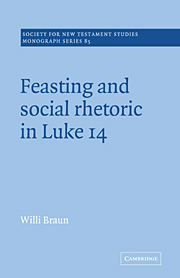Book contents
- Frontmatter
- Contents
- Acknowledgements and note on abbreviations
- 1 Introduction: how to read Luke 14?
- 2 Assumptions and preliminary reading
- 3 Jesus as a healer of craving desire (14.1–6)
- 4 Uncommon ‘symposium rules’ (14.7–11, 12–14)
- 5 The big dinner (14.15–24): aspects of Lukan performance
- 6 The conversion of a wealthy householder
- 7 Forms, genres and composition
- 8 Composition as argumentation: the rhetoric of Luke 14
- 9 Towards closure (and openings)
- Bibliography
- Indices
7 - Forms, genres and composition
Published online by Cambridge University Press: 28 August 2009
- Frontmatter
- Contents
- Acknowledgements and note on abbreviations
- 1 Introduction: how to read Luke 14?
- 2 Assumptions and preliminary reading
- 3 Jesus as a healer of craving desire (14.1–6)
- 4 Uncommon ‘symposium rules’ (14.7–11, 12–14)
- 5 The big dinner (14.15–24): aspects of Lukan performance
- 6 The conversion of a wealthy householder
- 7 Forms, genres and composition
- 8 Composition as argumentation: the rhetoric of Luke 14
- 9 Towards closure (and openings)
- Bibliography
- Indices
Summary
A brief reiteration of the principal points that arose in the examination of the discrete periods of the dinner episode should help us to approach another set of issues. These have have to do with the compositional plan and argumentative logic of the unit in its entirety. The scrutiny of the sub-units, loosely tethered to the poles of form, source and milieu analyses, allows several summary claims that raise the question of the design of the episode as a whole.
The importance of the forms
As to forms, the episode consists of heterogeneous speech types that in themselves are unremarkable; they are of the stuff common in the gospel literature, including the gospel of Luke. The episode begins with a chreia (14.1–6), proceeds through a line-up of sapiential sentences (14.8–10, 12–13), maxims (14.11, 14, 15) and a fictional story about a householder who invited guests (14.16–24), and concludes with an epilogion (14.24) that has a narrative function in the householder story but perhaps doubles as a rhetorical conclusion of the whole episode. All this merely states the obvious from the vantage point of a modest familiarity with textbook form criticism. And, for the reader whose percipience is guided primarily by, say, Bultmannian form criticism, neither the identification of the forms nor their sequence is of much significance for the composition of the whole episode.
- Type
- Chapter
- Information
- Feasting and Social Rhetoric in Luke 14 , pp. 132 - 144Publisher: Cambridge University PressPrint publication year: 1995

